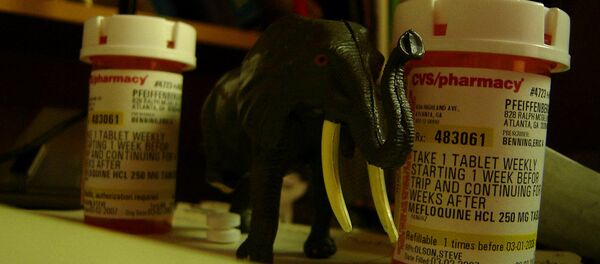Following long-held concerns over the use of the drug, the Commons Defense Select Committee released a statement saying they will be taking evidence into the issuing of Lariam to defense personnel.
"The Committee believes that this is a matter which merits further scrutiny. Therefore, it intends to take oral evidence on the use of Lariam by the armed forces. Details of witnesses and terms of reference will be announced in due course."
1,000 Troops in Mental Health Clinics Since 2008
The inquiry comes after a freedom of information (FoI) request earlier this year revealed that since 2008, 994 British service personnel had been admitted to mental health clinics or psychiatric hospitals after taking the anti-malaria drug.
.@CommonsDefence to inquire into the use of Lariam in the UK Armed Forces http://t.co/gD0o9fnNc9
— Defence Committee (@CommonsDefence) October 15, 2015
The figures also showed that the problem didn't seem to be improving, with more than 260 British troops requiring medical attention last year alone after taking the drug.
Psychosis, suicidal thoughts, hallucinations and depression were among the most commonly reported side effects from people who had taken Lariam, also known as Mefloquine.
The MoD has long defended its use of the drug, despite concerns over its damaging side effects, with fears the issuing of Lariam is contributing to an epidemic of mental health issues within Britain's armed forces.
In a letter to the chair of the committee, Dr Julian Lewis, defense secretary Michael Fallon said the drug's use "is under continual review" and "the health and wellbeing of our people is paramount, in this and all matters."
Defense officials acknowledged that internal records revealed that among those given Lariam, there was "a rate of 6% who presented for mental healthcare, compared to 3% amongst the general military population."
Critics Warned of 'Hallucinations, Psychosis, Suicide'
While an inquiry into the MoD's use of Lariam has only just been announced, concerns over the dangerous side effects of using the drug have been known as far back as 2007, when Dr Franz B Humer, then chairman of Roche, the company that manufactures the drug, told a general meeting that "more effective anti-malarials with better side-effect profiles were now available."
Meanwhile, in a further damning statement, Roche wrote to doctors in Britain in 2013, warning that as a result of using Lariam:
"…hallucinations, psychosis, suicide, suicidal thoughts and self-endangering behavior have been reported… [And Lariam] may induce potentially serious neuropsychiatric disorders."
Lariam has been banned, or used as an absolute last resort by the defense forces of the US, Germany, The Netherlands and Canada, while it's understood that the MoD issues the drug to British troops, but not pilots or drivers, increasing speculation that authorities are aware of the potential side-effects.
MoD's response to @CommonsDefence's #lariam questions avoids saying whether there were individual assessment pre 2013 (and post)
— philippa tuckman (@militarylawyer1) October 14, 2015
The MoD has justified its use of the drug, based on Public Health England guidelines, which state that it is "part of the range of malaria prevention treatments recommended," despite health officials warning that the use of Lariam "may increase the risk of psychosis and anxiety reactions."
UK Accused of Cost-Cutting
Other critics of the MoD have accused officials of putting money before the mental health of servicemen and women, pointing out that Lariam is considerably cheaper than other anti-malaria drugs such as Doxycycline and Malarone.
Following this year's FoI request, Tony Hayes, CEO of the Veterans Association UK (VAUK) told Sputnik that the lack of support given in general to returning veterans who have suffered as a result of conflict "beggars belief."
"In regards to the treatment of our guys, we're treated like absolute crap. If there are 1,000 people suffering from the side effects of this drug, then it doesn't surprise me that it would be kept very quiet. If the British government can save a penny on something, they will do so."
"It's extremely frustrating from my point of view. It's a dire situation, it shouldn't be happening," said Hayes.




